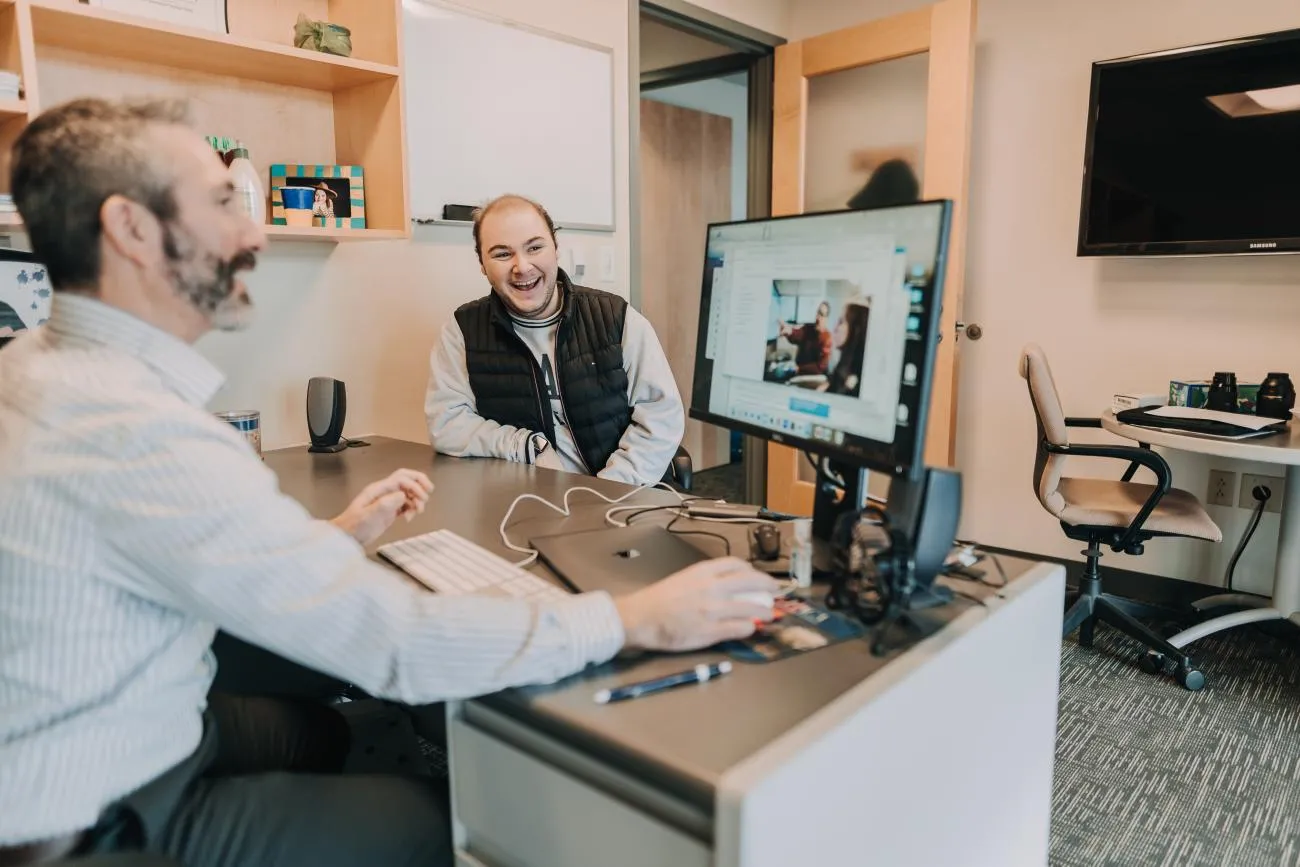Student supervisors bring invaluable expertise and mentorship to students in the collegiate environment. Tailoring guidance to individual needs, they serve as role models, offering insights into professional norms and personal development. By fostering an inclusive work culture, they empower students to thrive academically and professionally. They help students navigate challenges and develop essential skills, preparing them for future success. Their dedication shapes tomorrow's leaders.
Maximizing Potential

BUILD YOUR STUDENT WORKFORCE
Payment Information & Job Classifications
The Student Employment Handbook establishes standard practices for recruitment and management of all student employees. For more information on student employment best practices and standard operating procedure, please refer to the Student Employment Handbook or reach out to Student Employment or your HR Business Partner.
The Center was created in 2023 to help advance the College's Ithaca Forever strategic plan goal of becoming a national model for colleges committed to the values of diversity, equity, inclusion, and belonging. Additionally, the Center for EIB provides a coordinated, strategic, and intentional direction for the institution, and create sustainable processes and support systems that build on, learn from, and honor the long history of collective work that precedes this Center.
In this guide, you’ll find key elements that must be included in every job description, such as job title, overview, departmental details, reporting structure, hours and pay, and application process. Additionally, we emphasize the importance of clearly defining work requirements, tasks, duties, responsibilities, and candidate qualifications to facilitate informed applications from students.
With well-crafted job descriptions, you not only enhance the recruitment process but also contribute to the professional development of our student workforce, helping them gain valuable skills and experiences. Together, let’s create opportunities that empower our students to succeed in their employment journeys.

LinkedIn Learning
Tap into the power of LinkedIn Learning as your ultimate resource for student supervision. With a vast library of courses covering leadership, communication, mentorship, and more, you'll find everything you need to excel as a student supervisor. LinkedIn Learning offers personalized, on-demand learning experiences to suit your schedule and goals. Click here for recommended courses!
Student Supervisor Toolkit: Your Essential Resource for Effective Leadership
Leaders aren't born; they're made. With the right resources and training, anyone can become an effective student supervisor. Whether you're stepping into this role for the first time or seeking to enhance your skills, we're here to support you. Explore the resources below to unlock your potential and empower student success like never before. From mentoring to conflict resolution, our toolkit supports your journey in guiding students to excel. Step into your role with confidence and watch your leadership soar!
-
Creating equitable hiring practices and conducting effective student employment searches are essential for fostering diversity, inclusion, and fairness in the recruitment process. Here are some key strategies to consider:
- Diversify candidate sources: Reach out to varied communities and platforms for a broad candidate pool.
- Build diverse hiring teams: Ensure diverse perspectives in your team to mitigate biases.
- Use structured interviews and evaluation criteria: Ensure fair and consistent candidate assessment.
- Employ inclusive language and formatting: Craft accessible job postings free of bias or jargon.
- Prioritize potential over qualifications: Focus on relevant skills and growth mindset rather than conventional qualifications.
- Implement blind recruitment: Remove identifying details from applications to reduce unconscious bias.
- Redefine culture fit: Seek candidates who enrich organizational diversity rather than conforming to existing culture.
- 6 Best Practices for Creating an Inclusive and Equitable Interview Process - Harvard Business School (hbs.edu)
- Ensure Equitable Recruiting And Hiring With These Nine Practices (forbes.com)
- A Recruiting Leader's Guide to Equitable Hiring Practices | Capterra
- DEI Hiring: Creating a More Equitable Hiring Process | DeVryWorks
- Inclusive Hiring Resources Guide (harvard.edu)
- Hiring Manager Packet (harvard.edu)
-
Make every student employment opportunity meaningful by fostering growth, skill development, and personal enrichment. Emphasize clear expectations, provide mentorship, and offer opportunities for hands-on experience. By aligning tasks with students' interests and career goals, you can create a workplace where they feel valued and motivated to excel. Together, let's transform student employment into a pathway for learning, growth, and future success.
-
In the realm of student supervision, constructive feedback and performance discussions serve as essential pillars of growth. These conversations provide avenues for both mentor and student to identify strengths, address challenges, and chart a path toward improvement. By fostering an environment of open dialogue and support, supervisors empower students to reach their full potential academically and beyond. Embrace the power of constructive feedback and performance discussions to cultivate a culture of continuous learning and achievement among your students.
- 10 Examples of Constructive Feedback in the Workplace | Indeed.com
- A Guide To Giving Constructive Feedback (With Examples) | Indeed.com
- Constructive criticism that works (apa.org)
- How to Give Negative Feedback to Employees | Harvard DCE
- Positive Feedback: Why It's Important and How To Deliver It | Indeed.com
-
Workplace culture and recognition are vital in shaping student employment experiences. A positive culture fosters belonging and growth, while recognition boosts motivation and commitment. Initiatives like awards and advancement opportunities reinforce desired behaviors, leading to enhanced satisfaction, retention, and success for students in their roles.
To be effective, recognition should be fulfilling, authentic, personalized, and aligned with organizational values . Additionally, factors like having a clear purpose, opportunities for development, supportive management, ongoing communication, and leveraging strengths contribute to driving student employee engagement. Explore further insights on these topics through the provided links below:
- How to Strengthen and Sustain Workplace Culture Using Recognition (gallup.com)
- How to Improve Employee Engagement in the Workplace - Gallup
- Seven Ways To Build A Culture Of Employee Recognition (forbes.com)
- How do you foster a culture of recognition and appreciation among your employees? (linkedin.com)
- National Student Employment Week (Insidehighered.com)
- National Association of Colleges & Employers (NACE) is the leading source of information on the employment of the college educated, and forecasts hiring and trends in the job market; tracks starting salaries, recruiting and hiring practices, and student attitudes and outcomes; and identifies best practices and benchmarks.
- National Association of Student Personnel Administrators (NASPA) is a network of more than 15,000 members at 2,100 institutions coming together to support each other, overcome expanding challenges, and center student success in the evolution of higher education.
- Association of American Colleges & Universities (AACU) is a global membership organization dedicated to advancing the vitality and democratic purposes of undergraduate liberal education. Through their programs and events, publications and research, public advocacy and campus-based projects, AAC&U serves as a catalyst and facilitator for innovations that improve educational quality and equity and that support the success of all students.